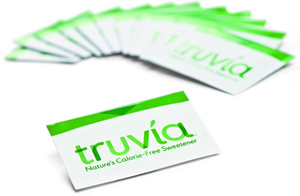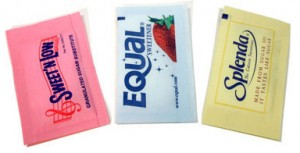 Truvia is the newest, zero-calories, natural sweetener to hit the market. Truvia was developed by Cargill and Coca-Cola. “Sweetness born from a leaf, not in a lab,” they say about the product. Truvia is made from the stevia plant, which is a native plant of South America. The stevia plant is not new and has been used as a sweetener in South America and Japan for centuries. However, in the US, thus far stevia has only been sold as a dietary supplement due to FDA concerns. The ingredient list of Truvia includes: Rebiana, Erythritol, and natural flavors.
Truvia is the newest, zero-calories, natural sweetener to hit the market. Truvia was developed by Cargill and Coca-Cola. “Sweetness born from a leaf, not in a lab,” they say about the product. Truvia is made from the stevia plant, which is a native plant of South America. The stevia plant is not new and has been used as a sweetener in South America and Japan for centuries. However, in the US, thus far stevia has only been sold as a dietary supplement due to FDA concerns. The ingredient list of Truvia includes: Rebiana, Erythritol, and natural flavors.
- Ribana portion comes from the sweet leaf of the stevia plant. These leaves are picked, dried, then submerged into water, which unlocks the sweetness portion and is then purified.
- Erythritol is a naturally occurring fermented sugar alcohol (found in grapes and pears). This sugar alcohol is made during a process using a culture (the product’s website said “a culture in a process like making yogurt from milk.”). It is then filtered, dried, and crystallized producing a pure, natural ingredient.
- Natural flavors portion of the product is defined (on the product’s homepage) as “Natural flavors used to bring out the best of our natural sweetness.”
As mentioned before, previously stevia could only be sold as a dietary supplement (not as a sweetener or a food additive) because of FDA concerns. However, Truvia will be the first stevia product not labeled as a dietary supplement. In studies funded by Cargill and Coca-Cola, Truvia has not shown any signs of health problems. *Keep in mind, whenever studies are funded by the makers of a product there are usually biases and they can manipulate findings to give a desired conclusion of the manufacturers.
 As you know, there’s no shortage of no-calorie sweeteners. The five approved by the FDA include:
As you know, there’s no shortage of no-calorie sweeteners. The five approved by the FDA include:
- Aspartame – NutraSweet and Equal.
- Sucralose – Splenda.
- Saccharin – Sweet’N Low, Sweet Twin, and Necta Sweet.
- Acesulfame-K – Sunett and Sweet One.
- Neotame – Approved for use as an ingredient in a wide variety of foods (i.e. baked goods, soft drinks, gum).
Truvia differs from those products because it’s natural. Also, it differs from other stevia products because “it’s backed by extensive safety studies,” claims a representative of Truvia producer Cargill.
So, if you want, check out your local market and see if they carry this product. Give it a taste and see if you like it. Just keep in mind, that you are consuming a sugar alternative, but the claims of being all natural is an advantage for Truvia. However, more studies are needed in order to determine the true safety of this product.

The Truvia is actually quite good. Actual granules like sugar, rather than the powder of other sweeteners. Tastes sweeter too. I wish I could find it a large bag to try baking. For right now, the little packages are great with coffee, in Greek yogurt, on fruit, etc.
I bought some Truvia to try. I do like it as a “natural” sweetener although I see how the FDA works on it’s approval of substances once big corporations get behind something. The marriage of Cargill and Coca-Cola to make millions, or more likely billions from a “natural” substance is suspect.
I want to know one thing. Everywhere I read about the process of making Truvia, the “purification” process is actually not explained. How is the product being “purified”? I’m afraid that the “purification” process could use something like chlorine or other chemicals to “purify” the substance. Does anyone have any information on this purification process??
I’m sorry but when I see the FDA banning a natural sweetener like Stevia for years, (no money in it for big companies), then suddenly now the Stevia plant has become the new darling sugar substitute for mass consumption, you have to take a step back and look at the big picture. Truvia is set to be infiltrated into many many products that we as consumers will purchase this year. In fact, I just bought some orange juice the other day that has a similar “natural” sweetener called “Purevia”. Guess what? That is the Pepsi Cola Company’s own “natural” stevia sweetener too. I am not impressed with the FDA’s track record of safety when it comes to sugar substitutes so you’ll have to pardon my skepticism. Also, why is Truvia sold in my local grocery store on the sugar aisle while other Stevia products are sold in the “health food or organic” section of the store?
Anyone else with me on this one??
You hit it on the head Debbie – I too would like to know more information on the FULL process of altering this natural substance so that they could put a patent on it! The FDA cares much less about public health than it does about fat pockets….